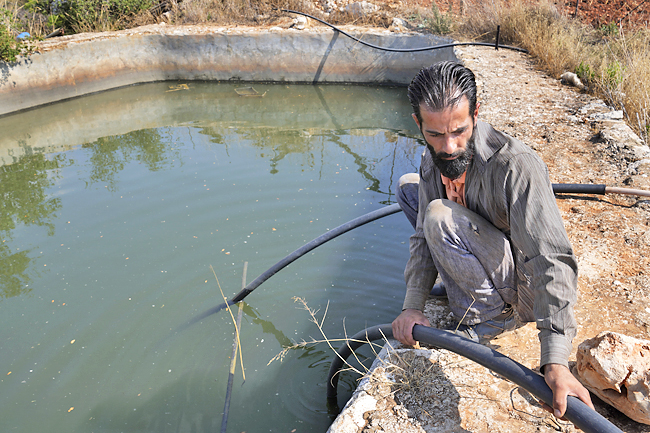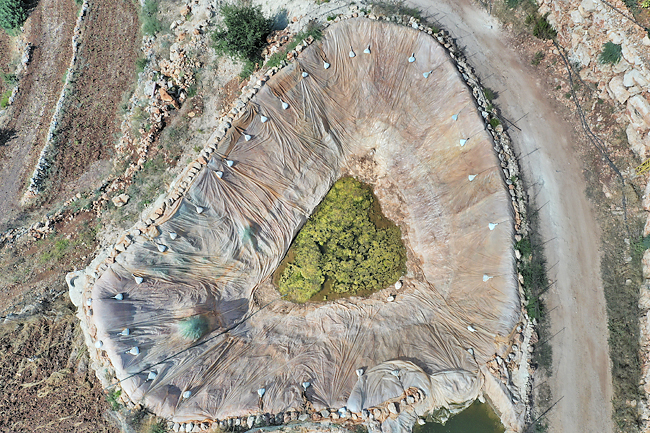HARF BEIT HASNA, LEBANON (AP) – Farmers in a small town perched on a northern Lebanese mountain have long refused to accept defeat even as the government abandoned them to a life off the grid.
Harf Beit Hasna receives almost no basic services. No water or sewage system, no streetlight or garbage collection. The only public school is closed. The nearest pharmacy is a long drive down a winding mountain road.
“We live on another planet,” said Nazih Sabra, a local farmer. “The state has completely forgotten us, and so have the politicians and municipalities.”
Its around 2,500 residents have gotten by because of an ingenious solution: They dug trenches, lined them with plastic and use them to collect rainwater.
For decades, the rainwater enabled them to grow enough crops for themselves, with a surplus to sell.
But where government neglect didn’t kill Harf Beit Hasna, the combination of climate change and economic disaster now threatens to.
In recent years, rainfall in Lebanon has decreased, straining even the most water-rich country in the Middle East.
At the same time, the country’s economy has fallen apart the past two and a half years; families whose livelihoods have been wrecked struggle to afford basics as prices spiral.


Harf Beit Hasna, on a remote mountain plateau above steep valleys, has taken pride in making it on its own with its rain-water pools. The town is dotted with them, most of them the size of a backyard swimming pool.
Sabra said he remembers in his childhood how his grandfather and other farmers could raise livestock and sustain a decent living.
But recent years have gotten harder. As rain declined and temperatures warmed, farmers adapted. They grew less of water-demanding produce like tomatoes and cucumbers and planted tobacco, a more drought-resistant plant.
Now they can barely grow enough to get by.
“If there isn’t rain, you use whatever you have left stored and work with a deficit,” Sabra said. “You can’t even afford to farm anymore.”
Sabra’s field is barren and dry, save some and potatoes. He tried to plant a small patch of tomatoes for his family’s use. But to save water, he had to let them die. The rotting tomatoes swarm with pests.
“There’s nothing we can do with them”, Sabra said.
He has a small patch of eggplants surrounded by barren, cracking soil. He hopes he can sell them in the nearby city of Tripoli to buy more potable water for his family this month.
“Those eggplants wouldn’t have been there without the ponds,” he said with a smile.
His pool, which can hold around 200 cubic metres of water, was only about a quarter full. The water was green, because he’s been drawing on it slowly, trying to ration out what’s left.
From his field, Sabra can see the Mediterranean Sea on the horizon and, below him, a valley where there are freshwater springs.
But gasoline is too expensive for him to drive daily to get water from there. He struggles to afford school for his children.
His home hasn’t had electricity for weeks because no power comes from the state network, and he can’t afford fuel for his personal generator.
Government services and infrastructure across Lebanon are decrepit and faltering. But Harf Bait Hasna’s situation is particularly bad.
It’s remote and hard to reach. Administratively, it’s caught between two different municipalities, neither of which wants to deal with it. And, residents say, it has no political patron – a crucial need for any community to get anything in Lebanon’s factionalised politics.
Sabra and other farmers said politicians for years have ignored their requests for a well or a connection to the state’s water network.
At Harf Beit Hasna, government neglect and climate change have combined to leave “an area very challenged with water security”, said Sammy Kayed, at the American University of Beirut’s Nature Conservation Center.
The disaster in the town is “much more profound (because) you have an entire community that is reliant on rain-fed agriculture” but can no longer rely on rain, he said.
Kayed, the co-founder and managing director of the Conservation Center’s Environment Academy, is trying to find donors to fund a solar-powered well for the town and to draw officials’ attention to get it connected to the state water network.



















































